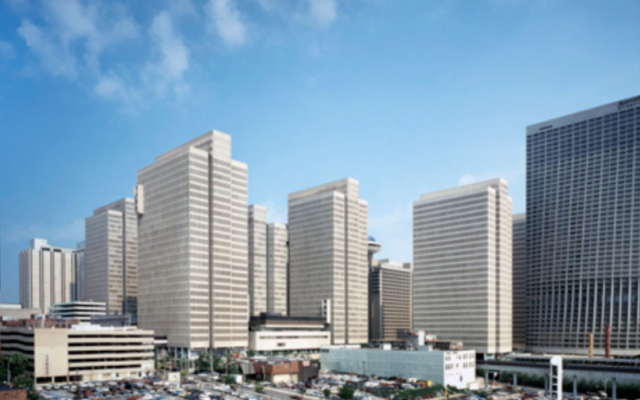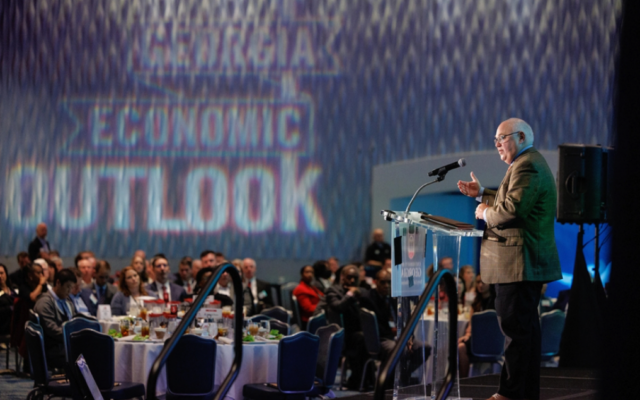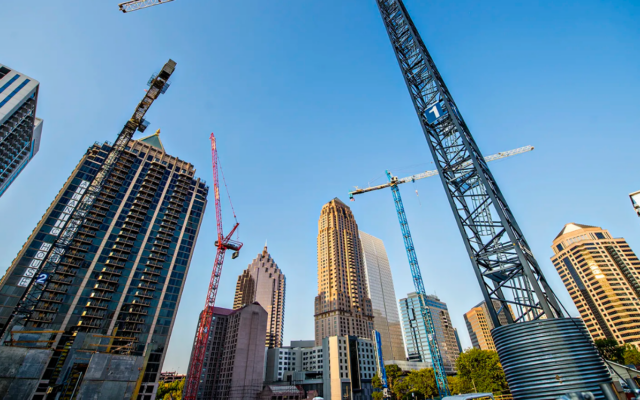Commercial Office Buildings Present New Challenges
Economic pressures, rising interest rates, and shifting patterns of work impact the demand for office space in Atlanta.
Despite the sight of numerous building cranes that have dotted the Atlanta skyline, commercial real estate may be in for a rough ride in the next few years. That’s the opinion of Jeff Humphreys, director of the Simon Selig, Jr. Center for Economic Growth at the University of Georgia. The reason, according to Humphreys, has a lot to do with the cost of borrowing money.
“Monetary conditions and the financial markets are not going to be very supportive of commercial real estate going forward. And they haven’t been for a while. Quite frankly, if you look at the submarkets, I think the office market is the one that’s performing the worst and will continue to underperform, and that’s partly because of higher interest rates.”
Several high-profile developments are already in trouble. The six office towers and shopping mall of The Peachtree Center complex in downtown Atlanta, which had a $140 million mortgage attached to it, foreclosed last September. It was the largest Atlanta real estate bankruptcy since the real estate recession 15 years ago and was once considered among the most innovative urban developments in the nation.
All those gleaming new office towers in Midtown and beyond are beckoning to tenants who have leased space in older buildings. It isn’t that overall demand for leased office space has increased by that much but that businesses are trading up. One investor who tracks distressed real estate trends, Henry Lorber, of Henry Lorber and Associates, has a more blunt assessment.

“We are cannibals in the office building business,” Lorber said. “The newer buildings being built and those that have been built up in Midtown are eating the tenants from downtown.”
Even new developments are in trouble. A high-profile bankruptcy occurred in March of this year when a 10-acre site for a mixed-use project called Force Atlanta went back to the lenders. Developers paid $26.5 million for the site near the Castleberry Hill development in downtown Atlanta.
One indication of the growing nervousness among real estate investors is the news that Blackstone real estate investment trust has been limiting withdrawals by investors since last November. In April, Blackstone, one of the largest and most stable REITs, only approved the release of $1.3 billion even though investors had requested $4.5 billion. The Blackstone trust manages $70 billion in investments.
Part of the pressure on the commercial market is due to the way commercial real estate is financed. Much of the money for projects is made through adjustable-rate mortgages and other short-term financing. Interest rates have almost doubled since the Federal Reserve started raising interest rates to dampen down inflation. Since March 2022 interest rates have increased 500 basis points which has had a big impact on what borrowers have to pay for their money. It is estimated that $625 million in loans for office buildings in metropolitan Atlanta will need to be refinanced this year. In New York City, it is $5.3 billion.

Vacancy rates are also high, averaging about 28 percent in the metro area, according to Cushman Wakefield. That’s almost double the national average of just over 15 percent. But not all that is due to economic developments. Increasingly, workers and the companies that employ them are embracing remote working particularly in a city which has some of the worst rush hour traffic in the country. Commutes lasting an hour or more are not unusual in the city, which impact morale and productivity.
Vacancy rates are also high, averaging about 28 percent in the metro area, according to Cushman Wakefield. That’s almost double the national average of just over 15 percent. But not all that is due to economic developments. Increasingly, workers and the companies that employ them are embracing remote working particularly in a city which has some of the worst rush hour traffic in the country. Commutes lasting an hour or more are not unusual in the city, which impact morale and productivity.
More than half of Americans, 58 percent, work from home at least once per week, according to a survey by McKinsey management consultants. Thirty-five percent work from home five days a week. When given a choice to work flexibly or not, 87 percent take it. By 2025, 36.2 million Americans may be clocking in from the comfort of their homes, says Upwork. According to McKinsey, “this represents a tectonic shift in where, when, and how Americans want to work and are working.”
Empty office buildings have wider implications that go beyond just new patterns of working. As occupancy declines, buildings lose the value that determines tax revenues. That could mean significant bites in the tax base that finances city and county government and social services like education.
Demand for office space is also down as companies have trimmed their needs in advance of a recession that so far has not materialized. Still, according to Humphreys at UGA’s Selig Center, a recession in the next year is a distinct possibility.
“I think Atlanta will probably go into recession, but it will be a milder variant of that recession…I think the odds of recession have diminished. Back in December, I was talking about a 65 percent chance of recession, even, maybe, 70 percent. I think now it is probably around 55 percent.”
- real estate
- Local
- Bob Bahr
- Jeff Humphreys
- Simon Selig
- Jr. Center for Economic Growth
- University of Georgia
- commercial
- The Peachtree Center
- bankruptcy
- Henry Lorber and Associates
- Force Atlanta
- Castleberry Hill
- Blackstone
- REITs
- Federal Reserve
- inflation
- Interest Rates
- Cushman-Wakefield
- McKinsey
- Upwork




comments